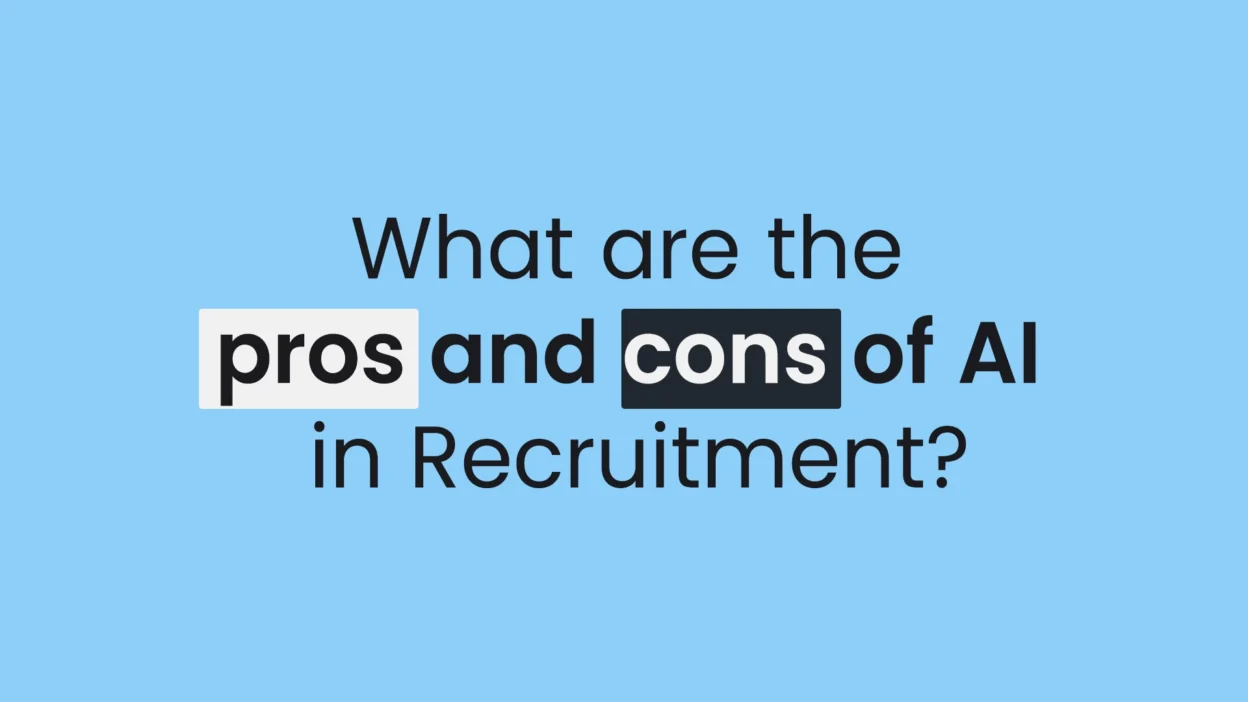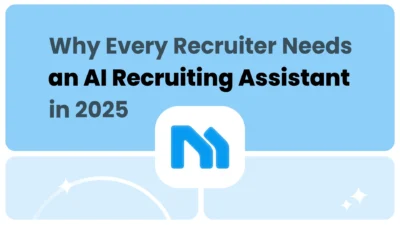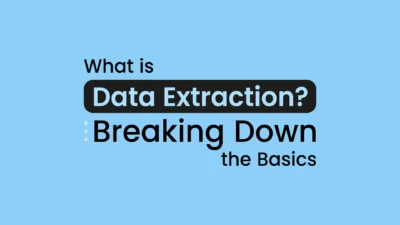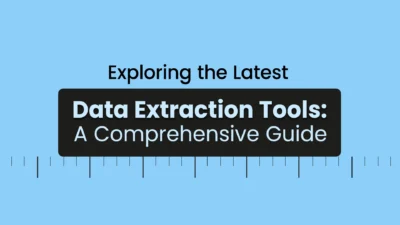What Are the Pros and Cons of AI in Recruitment? Let’s say you’ve applied for your dream job and get a prompt response. No waiting, no uncertainty. That is exactly what AI is doing to recruitment. More companies are using AI-driven recruitment tools to speed up processes, minimize repetitive work, and improve hiring decisions.
AI provides ease and efficiency but does raise some concern about fairness, bias, and ethics. So, what are the pros and cons of AI in recruitment? Let’s discover its application in talent acquisition, recruitment decisions, and overall recruitment efficiency.
Table of Contents
Advantages of Implementing AI in Hiring Processes
AI is transforming the recruitment industry by offering a number of advantages that increase efficiency and accuracy. Some of the key advantages of AI in talent acquisition include the following:
1. Enhancing Screening Efficiency
One of the benefits of AI recruitment is that it can search through thousands of resumes in seconds. AI-powered ATS use pre-set parameters to filter out unqualified candidates. This allows recruiters to focus on the most promising candidates. It also speeds up the hiring process and allows hiring managers not to be overwhelmed by numerous candidates.
2. Reducing Biases in Pros and Cons of AI in Recruitment
AI can help eliminate unconscious human prejudice in hiring by assessing candidates based on facts and more objectively, irrespective of personal impressions. AI-driven solutions align experience, abilities, and qualifications irrespective of gender, ethnicity, or age. This relies on the quality of data used to train AI models in the past, and we will discuss this in detail below under challenges.
Read More: Why Recruitment Automation Matters?
3. Cost and Time Savings
It has never been an expensive and time-consuming process to hire, and AI can help save considerable costs by automating repetitive tasks such as resume parsing, interview scheduling, and basic testing. This allows recruiters to concentrate on the strategic aspect of hiring, such as candidate experience and employer brand.
Read More: How AI Are Revolutionizing AI Software Development?
4. Improving Candidate Experience
Chatbots and AI-powered virtual assistants provide instant feedback to candidate queries making the hiring team able to make the application process easy. Instant feedback and openness improve candidates’ overall experience and impression of the employer.
5. Enhanced Talent Matching in Pros and Cons of AI in Recruitment
AI recruitment software uses machine learning algorithms to match job candidates with job openings on the basis of their skills, experience, and behavioral traits. AI provides a better match between job candidates and job openings by analyzing large sets of data. This leads to higher levels of employee retention.
6. Predictive Analytics for Smarter Hiring Decisions
AI uses predictive analytics to rank candidate potential and predict future performance. By integrating data extracted through tools such as the LinkedIn Profile Scraper—which gathers comprehensive candidate details from professional networks—AI can analyze historical hiring patterns, discern trends, and recommend candidates with the best chance of success for a specific position, ultimately enabling companies to make better long-term hiring decisions.
LinkedIn Profile Scraper - Profile Data
Discover everything you need to know about LinkedIn Profile Scraper , including its features, benefits, and the different options available to help you extract valuable professional data efficiently.
Potential Drawbacks and Challenges of AI Recruitment Tools
Many people truly ask “what are the pros and cons of AI in recruitment?” While AI is introducing undeniable benefits to hiring, we can still name some disadvantages of using AI for recruitment. 5 of the most significant drawbacks of applying AI in hiring are:
1. Risk of Algorithmic Bias
AI is trained on historical data, and if the data is biased, AI will replicate and even exaggerate them. For instance, if previous hiring patterns favored a specific group, the AI system may unintentionally filter out diverse candidates, defeating the purpose of equitable hiring.
2. No Human Judgment, Emotional Intelligence
Hiring is more than matching skills against job specifications; there’s personality to evaluate, motive, and fit with corporate culture. AI can’t self-learn on the job from its absence of emotional intelligence or fairly score tough-to-quantify soft skills. AI solutions can screen applicants who may not have fit exact algorithmic parameters but were an excellent fit in general.
3. Prospective Privacy, Data Security Complications
AI recruitment software relies on vast amounts of personal data, and there are concerns regarding data privacy and security. Organizations must ensure they are complying with data protection laws such as GDPR to avoid legal and ethical issues in the handling of candidate data.
4. Inflexibility in Decision-Making
AI-driven recruitment software employs strict algorithms and may not be flexible while handling exceptional cases. For instance, a candidate with rare experience or career gap may be overlooked even when she possesses the proper skills and potential to perform well at work.
5. High Implementation Costs
While AI is likely to bring the cost of recruitment down eventually, the initial cost of deploying AI-based recruitment tools can be quite high. Small and Medium-sized Businesses will be unable to afford AI recruitment solutions due to paucity of funds.
Impact of AI on Recruitment Efficiency and Speed
The most apparent Impact of automation on hiring decisions is the rate at which job applications can be handled by a computer. The traditional hiring process entails recruiters to read resumes manually, arrange interviews, and perform initial screenings, which could take weeks or months. AI shortens this time significantly by automating all these processes, allowing companies to hire faster.
In addition, recruitment tools powered by AI offer informative insights through the analysis of data. Through hiring trends and study of performance, recruiters are able to improve the process of selection and make judicious decisions. AI reduces the chances of errors committed by human beings, with improved accuracy in the evaluation of candidates.
But some experts are of the view that AI may divert the attention from people to people in a way inclined towards efficiency and effectiveness rather than working with human beings, causing no personal building of relationships between employers and applicants. This can turn into an icy hiring procedure, discouraging quality candidates to organizations that entirely rely on AI.
Addressing Bias and Fairness in AI-Driven Recruitment
One of the most debated issues regarding AI recruitment is what impact it will have on diversity and fairness. Whereas AI can ensure prejudice ends, it can equally ensure biases become more common if done well. For those issues, the solution rests on a mix of human interventions as well as ethical AI design.
1. Diversity in Training Data
In order to minimize biases, organizations must ensure that AI models are trained on diverse sets of data based on different demographics and backgrounds. This should be anticipated to create fairer hiring algorithms that do not disproportionately exclude or include certain groups.
2. Regular Audits and Monitoring
There should be frequent auditing of AI recruitment tools in order to identify and correct biases. This includes algorithmic testing to establish fairness and correcting where necessary in a bid to prevent discrimination in the hiring process.
3. Human-AI Collaboration
AI has to be employed to assist, not replace, the human decision. AI has to be made available to recruiters as an aid while they retain the final decision to employ. A blended approach enables AI to perform optimally without compromising fairness and human judgment.
4. Transparency of AI Hiring Decisions
Job candidates should be informed of the hiring process involving AI and on what grounds the job offers are made. Openness in AI recruitment practices is credible and allows applicants to understand on what grounds they were hired or rejected.
Conclusion of What are the pros and cons of AI in Recruitment
So, what are the pros and cons of AI in recruitment? AI has certainly transformed talent acquisition by injecting greater efficiency, lowering hiring bias, and enhancing candidate experience. But it also has its downside, such as the risk of algorithmic bias, absence of human judgment, and data security issues.
To achieve the potential of AI in recruitment, companies must use a balanced approach that combines AI automation and human decision-making. Leveraging innovative tools such as Magical Api can further reduce bias, ensure transparency, and promote responsible AI usage. This balanced strategy empowers companies to build a fair and effective recruitment process that benefits both employers and candidates alike.
AI isn’t a one-size-fits-all solution, but if it is properly used, it can be a revolutionary tool that revolutionizes recruitment.





